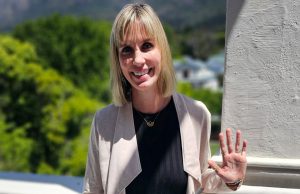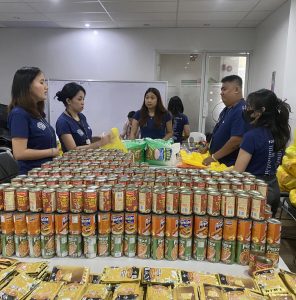In the quiet, green hills of Desa Les, northeast Bali, something remarkable happens each day. Inside a purpose-built, vibrant community center, young adults, once unsure of their future, are now mastering culinary techniques, refining hospitality skills, and shaping dreams they never thought possible. Through this essential training, young people who have been constrained by circumstance can now reach their full potential.
This is the transformative power of philanthropy.
Stories like this demonstrate what’s possible when giving is rooted in empathy, long-term commitment, and deep local collaboration. They are proof that meaningful change requires intention, humility, and trust.
Most importantly, they challenge us to rethink the role of philanthropy today, not as a one-off act of generosity, but as a shared responsibility, a strategic force for equity, and a powerful invitation to do better, together.
Rethinking the Role of Foundations
For over two decades, Amicorp Community Foundation (“ACF”) has asked: How do we create enduring value for communities and the systems they exist within?
We’ve learned that to answer that question, we must go beyond traditional charity models. We’ve had to challenge assumptions, partner differently, and most of all, listen. From the very beginning, our work has focused on building long-term capacity, not dependency.
Whether in South Africa’s rural villages, the coastlines of Curaçao, the mountains of the Philippines, or the rice fields of Bali, every ACF initiative begins with one truth: the solutions already exist within communities. Our job is to support, co-create, and then step back so those solutions can thrive on their own.
And while we’re proud of our work, we know we’re not alone. Around the world, a quiet revolution is underway. Foundations and nonprofits are moving from aid to impact, from top-down support to ground-up empowerment. The model of philanthropy is shifting, toward equity, sustainability, and shared ownership.
“Doing good should not be the exception. It should be part of how we do business, live our values, and measure success.”
ACF Projects Drive System Systemic Impact
Bali: Skills That Shape Futures
In Desa Les, northeast Bali, a vibrant vocational centre has become a lifeline for young adults seeking more than subsistence. Through culinary and hospitality training, learners gaining technical skills, building confidence, unlocking opportunity, and shaping the next chapter of their lives with pride.
This program exists because the community asked for it. We listened, and responded with long-term investment, local trainers, and ongoing mentorship. The result is a model that builds skills and sustains self-worth.
“When communities are given the tools and trust to lead, the results go far beyond our imagination.”
How We Do Good
We co-design every vocational program with local leaders, ensuring it reflects cultural realities, economic needs, and long-term opportunity.
Do Your Bit!
Support or sponsor local training centres wherever you are, skills are seeds for dignity, independence, and generational upliftment. Click here to support.
Curaçao: Laying Foundations in Early Childhood
In the vibrant island nation of Curaçao, we support early childhood development centres that prepare children for school and families for success. By integrating play-based learning, caregiver support, and teacher training, our programs aim to shift the trajectory of entire communities.
The science is clear: early investment has the greatest long-term return. But beyond the data, there is joy, curiosity, and the wide-eyed wonder of children who now have a safe, nurturing space to learn and grow.
“Empowering a child early is the most strategic investment any society can make.”
How We Do Good
We work together with educators and families to build community-based solutions that support holistic childhood development.
Do Your Bit!
Donate books, volunteer your time, or help advocate for access to early education in underserved areas near you. Click here to support.
South Africa: Youth Empowerment Through Training
In the heart of Limpopo, South Africa, the new Vocational Training Centre is opening doors for young people eager to find their footing in the world of work. Focused on practical trades and small business skills, the initiative is rooted in local economic needs and designed with community participation from day one.
We offer training that helps young people build livelihoods, become contributors, and stay connected to their communities.
“Talent is everywhere. Opportunity is not. We’re here to close that gap.”
How We Do Good
We align training programs with regional demand, ensuring learners graduate with relevant, employable skills, and a sense of pride.
Do Your Bit!
Mentor a young entrepreneur. Sponsor a toolkit. Start a conversation about youth employment in your region. Click here to support.
The Philippines: Rebuilding Forests and Futures
Along coastal communities in the Philippines, reforestation is essential for economic growth. Local teams are trained and employed to restore degraded forests, improve biodiversity, and rebuild their communities from the roots up.
Environmental restoration projects like these demonstrate that climate action and poverty reduction are not separate goal, they are deeply connected, and deeply human.
“Regreening the planet starts with restoring dignity and income to the people who live on the land.”
How We Do Good
We fund community-led reforestation efforts that generate livelihoods, improve local ecosystems, and educate the next generation of environmental stewards.
Do Your Bit!
Reduce your footprint, support reforestation nonprofits, or organize a tree-planting event in your community. Click here to support.
Global Inspiration – Different Voices Echo Our Values
Around the world, we are witnessing a powerful shift in how impact is delivered. The most successful initiatives are not the loudest or the largest, they are grounded in humility, partnership, and a deep understanding of place.
In Cambodia, the Sala Baï Hotel and Restaurant School offers free hospitality training to underprivileged youth, with an exceptional job placement rate that uplifts entire families. In Vietnam, Streets International delivers a similar model through a self-sustaining social enterprise, turning learners into leaders of their own lives.
In Madagascar and Kenya, the Eden Reforestation Projects employ thousands of residents to plant trees and restore degraded forests, proving that climate action and economic opportunity can, and should, go hand in hand. And in India, Haiti, and Kenya, Sadhana Forest combines ecological education with deep community integration, demonstrating that environmental stewardship is also a spiritual practice.
These organisations may operate in different regions, but they are aligned by the same truth: when people are trusted, supported, and resourced, they rise.
“Sustainable change doesn’t scale through power; it spreads through partnership.”
When Business Leads with Purpose
One of the most significant shifts in our time is the expectation that businesses, not just nonprofits, take the lead in addressing global challenges.
At Amicorp, this is our mandate. Through the Amicorp Community Foundation, 1% of Amicorp Group’s net revenue is dedicated to social and environmental impact. More than that, every employee has ESG-related goals embedded into their performance metrics.
Doing good is not a side project, it is embedded into the DNA of how we operate.
This philosophy is mirrored in the growing influence of international frameworks like the Task Force on Climate-Related Financial Disclosures (“TCFD”) and the Sustainability Accounting Standards Board (“SASB”). Businesses are being held to higher standards, not just by regulators, but by consumers, investors, and employees who expect more.
“Today, doing good is not a choice between profit and purpose, it’s the way forward for both.”
The Future of Philanthropy
It’s clear: we are living in a time of global transition. Climate change, inequality, and displacement are pressing realities, but so is the momentum of solutions, community by community.
Organisations like the Orphaned Starfish Foundation, which teaches digital skills to vulnerable youth across 25 countries, remind us that innovation is not always about scale, it’s about precision and heart. In Thailand, the Samsara Foundation quietly builds dormitories, sanitation systems, and libraries in remote areas, changing the future for thousands without fanfare.
These efforts are not anomalies. They are the new face of philanthropy, intentional, inclusive, integrated.
“The future of giving is not charity, it’s shared stewardship.”
Why Doing Good Is Everyone’s Business
Philanthropy is no longer the preserve of the wealthy or the domain of foundations. We are seeing a movement from charity to systemic change, from paternalism to partnership, from occasional giving to embedded responsibility. For those of us working within foundations, this evolution is both a challenge and an opportunity.
It is time that we all start to rethink legacy models, to center equity, and to advocate for philanthropy as a collective ethic rather than an elite endeavor. And it calls on us to learn continuously from each other, from the communities we serve, and from the world we want to shape.




